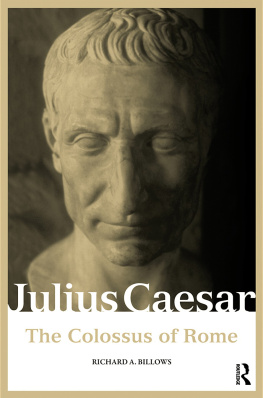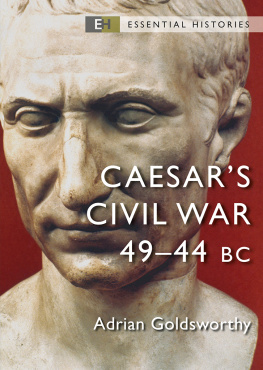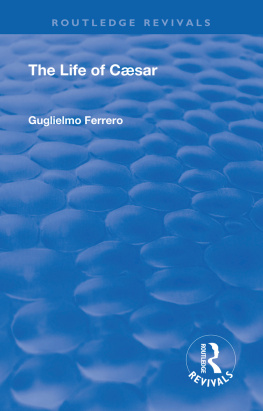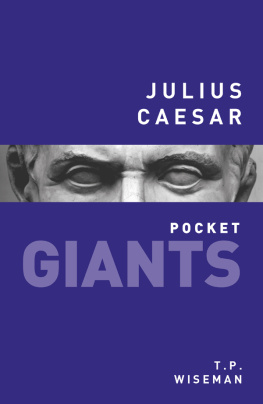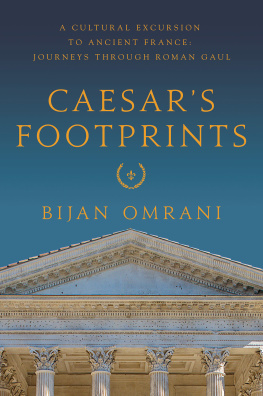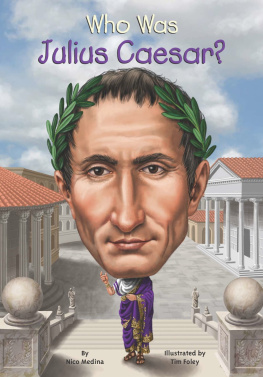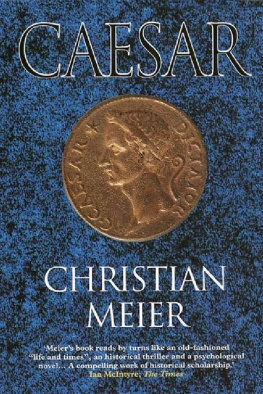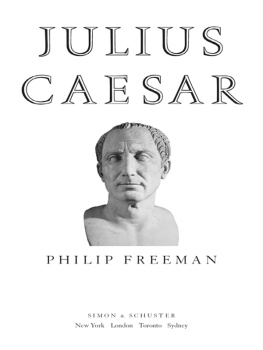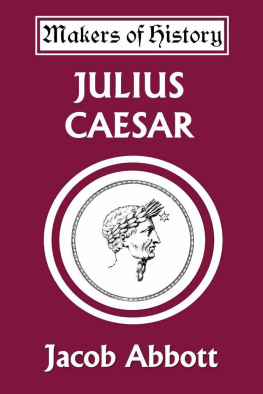JULIUS CAESAR:
THE COLOSSUS OF ROME
Julius Caesar offers a lively, engaging, and thoroughly up-to-date account of Caesars life and times. Richard Billows dynamic and fast-paced narrative offers an imaginative recounting of actions and events, providing the ideal introduction to Julius Caesar for general readers and students of classics and ancient history.
The book is not just a biography of Caesar, but a historical account and explanation of the decline and fall of the Roman Republican governing system, in which Caesar played a crucial part. To understand Caesars life and role, it is necessary to grasp the political, social, and economic problems Rome was grappling with, and the deep divisions within Roman society that came from them. Caesar has been seen variously as a mere opportunist, a power-hungry autocrat, an arrogant aristocrat disdaining rivals, a traditional Roman noble politician who stumbled into civil war and autocracy thanks to being misunderstood by his rivals, and even as the ideal man and pattern of all virtues. Billows argues that such portrayals fail to consider adequately the universal testimony of our ancient sources that Roman political life was divided in Caesars time into two great political tendencies, called optimates and populares in the sources, of which Caesar came to be the leader of one: the popularis faction.
Billows suggests that it is only when we see Caesar as the leader of a great political and social movement, that had been struggling with its rival movement for decades and had been several times violently repressed in the course of that struggle, that we can understand how and why Caesar came to fight and win a civil war, and bring the traditional governing system of Rome to an end.
Richard A. Billows is Professor of Greek and Roman History at Columbia University in New York. His publications include Antigonos the One-Eyed and the Creation of the Hellenistic State. Recent research interests include the origins of the Greek city-state, the collapse of the Roman Republic, and the origins of Christianity.
ROMAN IMPERIAL BIOGRAPHIES
Also available from Routledge:
Augustus, Pat Southern
Tiberius the Politician, Barbara Levick
Caligula, Anthony A. Barrett
Claudius, Barbara Levick
Agrippina, Anthony A. Barrett
Nero, Miriam T. Griffin
Year of the Four Emperors, Kenneth Wellesley
Vespasian, Barbara Levick
Domitian, Pat Southern
Nerva and the Roman Succession Crisis of AD9 699, John D. Grainger
Trajan, Julian Bennett
Hadrian, Anthony R. Birley
Marcus Aurelius, Anthony R. Birley
Septimius Severus, Anthony R. Birley
Aurelian and the Third Century, Alaric Watson
Diocletian and the Roman Recovery, Stephen Williams
Constantine and the Christian Empire, Charles M. Odahl
Theodosius, Gerard Friell & Stephen Williams
The Age of Justinian, J.A.S. Evans
JULIUS CAESAR:
THE COLOSSUS OF ROME
Richard A. Billows
Routledge
Taylor & Francis Group
LONDON AND NEW YORK
First published 2009 by Routledge
2 Park Square, Milton Park, Abingdon, Oxon OX14 4RN
Simultaneously published in the USA and Canada by Routledge 270 Madison Ave, New York, NY 10016
Routledge is an imprint of the Taylor & Francis Group, an informa business
2009 Richard A. Billows
All rights reserved. No part of this book may be reprinted or reproduced or utilised in any form or by any electronic, mechanical, or other means, now known or hereafter invented, including photocopying and recording, or in any information storage or retrieval system, without permission in writing from the publishers.
British Library Cataloguing in Publication Data
A catalogue record for this book is available from the British Library
Library of Congress Cataloging in Publication Data
Billows, Richard A.
Julius Caesar: the colossus of Rome / Richard A. Billows.
p. cm.
1. Caesar, Julius. 2. Heads of stateRomeBiography.
3. GeneralsRomeBiography. 4. RomeHistoryRepublic,
26530 B.C. 5. RomeSocial conditions51030 B.C.
6. RomeHistoryRepublic, 26530 B.C.Historiography.
I. Title.
DG261.B55 2008 9379.05092dc22 [B]
2008026698
ISBN 0203412761 Master ebook ISBN
ISBN 10: 0415333148 (hbk) ISBN 10: 0203412761 (ebk)
ISBN 13: 9780415333146 (hbk) ISBN 13: 9780203412763 (ebk)
Brutus
I do believe that these applauses are
For some new honours that are heaped on Caesar.
Cassius
Why, man, he doth bestride the narrow world
Like a Colossus, and we petty men
Walk under his huge legs, and peep about
To find ourselves dishonourable graves.
Shakespeare, Julius Caesar, Act 1 scene 2, 13439
DEDICATION
During my career as a professional historian, I have been fortunate to be closely associated with two of the greatest Roman historians of their generation: Erich S. Gruen and William V. Harris. To them I dedicate this book, in the full knowledge that they will both, in different ways, find much to disagree with here, but in the hope that they will find their time reading it well spent all the same.
Contents
Acknowledgements
Many people besides the author contribute to the production of a book, and it is my pleasant duty here to thank some of the key people who have contributed to making this book the best it can be. In the first place, Richard Stoneman, not only the former Classics Editor at Routledge but also a scholar in his own right, believed in this project at the start and signed me up to write this book. His successor Lalle Pursglove has been extraordinarily patient and always encouraging in the face of my frequent distraction by other matters; and Stacey Carter and the rest of the team at Taylor and Francis Publishing have also been very helpful. Rob Brown and his production team at Saxon Graphics have done a terrific job preparing the text and the front matter (maps and illustrations) for publication, showing enormous patience in dealing with a finicky and at times distracted author. My thanks too to the copy editor Susan Curran and the indexer Jackie Brind for both doing a first rate job. The ideas presented here have been long in gestation. My interest in late Republican Rome was first piqued, and my ideas about it began to develope, some 30 years ago now during Oxford tutorials with the late George Forrest, a remarkable teacher and scholar. I could wish he were still alive to read this book. Finally, my wife Clare and daughters Madeline and Colette deserve recognition for having had to live with this project for too many years. Thank you all!
Preface
Caesar is a historical figure who has never failed to fascinate, and the ending of the Roman Republican governing system is likewise a topic that has never failed to fascinate. Many, many historians, both academic professionals and enthusiastic amateurs, have written about one or both of these topics, creating a huge bibliography on the subject. Since it has been my aim to write for a wider audience than just fellow scholars of ancient Rome, I have not in this book followed the scholars habit of carrying on a running debate with earlier scholars in notes. Instead, I use the notes as a guide to the ancient source material on which our knowledge of Caesar and the later Roman Republic is based. At the end of this book is a bibliography which lists the more interesting and/or important books and articles (in my opinion) relevant to these two related subjects, and anyone sufficiently interested can pursue any of the subjects raised in the course of this book via the works listed there. The works in the bibliography (or most of them) have had some influence on the development of my ideas on these topics. Here, in this Preface, I offer to the reader a brief discussion of the most important ancient writers and texts that form the basis for our knowledge, and of the modern historical works that have to my mind been the most important contributions to our understanding of and ideas about Caesar and the collapse of Romes traditional governing system: these are certainly the ones that have contributed most to my understanding and ideas.
Next page
